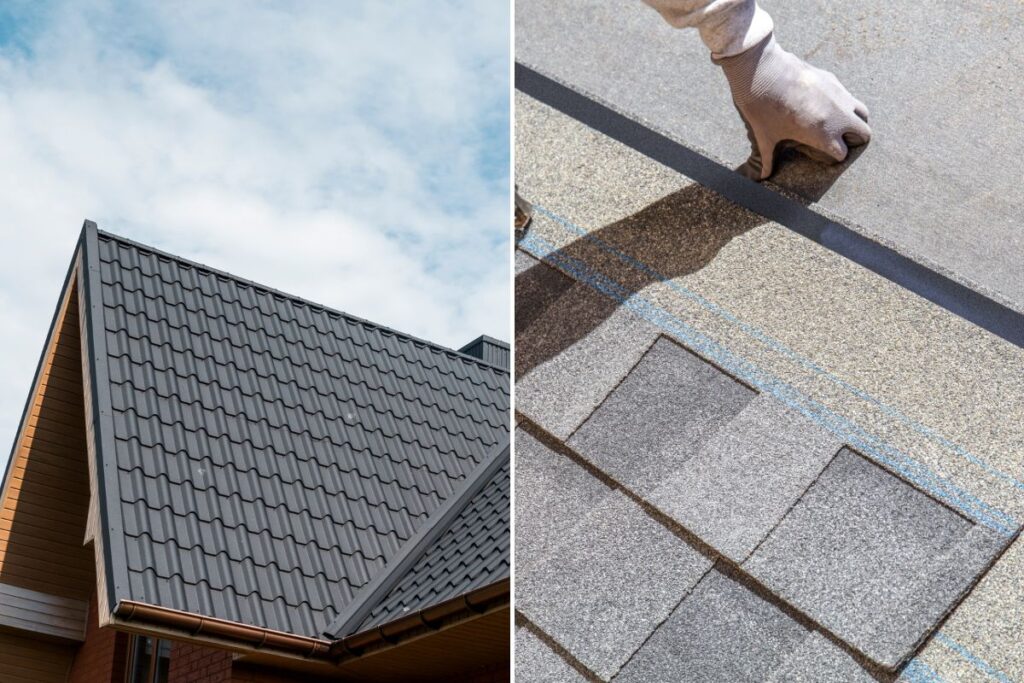When deciding on a roof style for your property, weighing the advantages and drawbacks of flat roofs versus sloped roofs is crucial. Both options offer unique features that cater to different preferences and functional needs. Property owners in Georgia face specific considerations, such as climate and aesthetic appeal. Whether you’re constructing a new building or renovating an existing structure, understanding these factors will help you make an informed decision. For homeowners and businesses looking into roofing Columbus GA, this guide provides a detailed comparison of flat and sloped roofs to help you choose the best fit for your needs.
Flat Roof Benefits: Modern Aesthetic, Easy Maintenance, and Usable Space
Flat roofs have gained popularity for their sleek, modern aesthetic and practical benefits.
1. Modern Aesthetic
Flat roofs provide a contemporary look, aligning with minimalist and modern architectural styles. They create clean lines and blend seamlessly with urban and industrial designs. This aesthetic appeals to property owners aiming for a distinctive and forward-thinking appearance.
2. Easy Maintenance
Flat roofs are easier to access compared to their sloped counterparts, making routine inspections and maintenance tasks more straightforward. HVAC systems and other rooftop installations are more accessible, saving time and labor costs when performing repairs or upgrades.
3. Usable Space
One of the standout benefits of flat roofs is their potential for additional usable space. From rooftop gardens to patios or even solar panel installations, flat roofs offer extra functionality that can enhance the value and utility of a property. This feature is especially beneficial for urban settings where outdoor space is limited.
4. Cost-Effectiveness
Flat roofs are often more affordable to install than sloped roofs due to simpler construction processes and reduced material requirements. This makes them an attractive option for property owners working within a tight budget while still seeking functionality and style.
Flat Roof Challenges: Drainage Issues and Limited Material Options
While flat roofs offer notable benefits, they also come with some challenges. Property owners should consider the following potential drawbacks:
1. Drainage Issues
Flat roofs are more prone to drainage problems than sloped roofs due to their lack of natural incline. Without proper drainage systems, water can pool on the surface, leading to leaks, structural damage, or mold growth. Regular inspections and proactive maintenance are essential to avoid these issues.
2. Limited Material Options
Compared to sloped roofs, flat roofs offer fewer material choices. Common options like EPDM, TPO, or modified bitumen may not appeal to everyone, especially those prioritizing aesthetics. Additionally, the lifespan of flat roof materials may be shorter in regions with heavy rainfall or extreme temperature fluctuations, requiring more frequent replacements.
3. Thermal Performance Concerns
Flat roofs can struggle with energy efficiency, as they tend to absorb more heat in warmer climates due to their lack of slope. Without proper insulation or reflective materials, energy costs for cooling can rise significantly during hot seasons.
Sloped Roof Benefits: Efficient Water Runoff and Broader Material Selection
Sloped roofs have been a traditional choice for centuries, providing both practical and aesthetic advantages.
1. Efficient Water Runoff
The steep incline of sloped roofs facilitates efficient water runoff, reducing the likelihood of pooling and leaks. This feature is particularly advantageous in areas with heavy rainfall, such as Columbus, GA. Proper water management helps extend the roof’s lifespan and prevents costly water damage to the property.
2. Broader Material Selection
Sloped roofs offer a wide variety of material options, including asphalt shingles, metal, clay tiles, and slate. Each material comes with unique benefits, allowing property owners to customize their roofs according to their budget, durability requirements, and design preferences. The versatility of sloped roofs makes them suitable for various architectural styles, from classic to modern.
3. Energy Efficiency
Sloped roofs are often more energy-efficient than flat roofs, especially when paired with proper ventilation systems. The natural slope allows for better airflow, reducing heat buildup in the attic and keeping energy costs manageable. This is particularly beneficial in hot climates.
Sloped Roof Challenges: Higher Initial Installation Costs
Despite their benefits, sloped roofs also present certain challenges that property owners should consider.
1. Higher Initial Installation Costs
The complexity of installing a sloped roof typically leads to higher upfront costs compared to flat roofs. This includes the price of materials, labor, and additional structural considerations. While the long-term benefits, such as durability and energy efficiency, often offset these costs, they may pose a financial hurdle for budget-conscious property owners.
2. More Complex Maintenance
Maintaining a sloped roof can be more challenging due to its steep incline. Cleaning gutters, inspecting shingles, and repairing damage often require specialized equipment or professional assistance, which can increase long-term maintenance costs.
3. Space Limitations
Unlike flat roofs, sloped roofs do not offer usable space for activities like rooftop gardens or patios. This limitation may be a drawback for property owners seeking to maximize their outdoor or recreational space.
Conclusion
Choosing between a flat roof and a sloped roof depends on your property’s needs, aesthetic goals, and budget. Flat roofs are ideal for modern designs and maximize functionality with their accessible surfaces, while sloped roofs excel in water management and material variety. Consulting experts in the field is key to ensuring the best outcome for your investment. For those seeking professional guidance, roofing companies Columbus GA, such as Buckeye Roofing Of Columbus, can provide tailored solutions to meet your specific requirements. Whether you choose a flat or sloped roof, making an informed decision will help protect your property for years to come.






